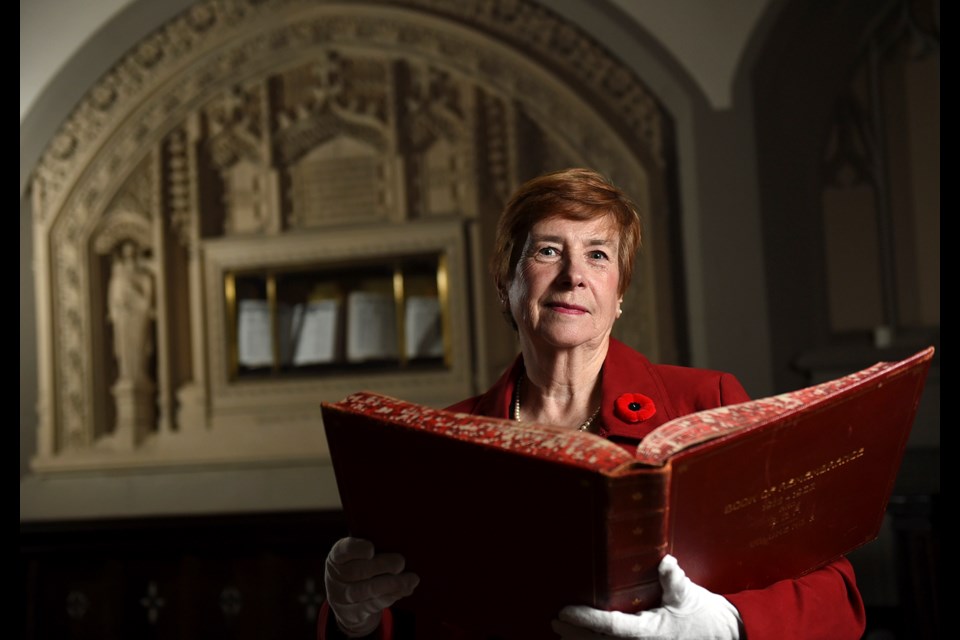Hugh Russel was a 23-year-old fighter pilot from the Montreal area who was shot down over the English Channel on June 16, 1944. Like every soldier, sailor and airman who died in the First and Second World Wars, Russel’s name is inscribed in the Books of Remembrance that are housed in stately honour at the Peace Tower, which forms the centrepiece of Canada’s Parliament Buildings in Ottawa.
Most people who have taken the elevator to the top of the Peace Tower have seen these books. But most people do not know that there are actually two sets in existence. The other volumes are right here in Vancouver, preserved and protected by the congregation of Canadian Memorial United Church at Burrard and 15th.
Earlier this year, I wrote a column on the unusual history of this church. It was the brainchild of a Second World War chaplain, Rev. George Fallis, who was determined to construct a national church — in Vancouver, because that’s where he was from — to pay tribute to those who gave their lives in war. He travelled the country raising funds and commissioned stunning stained glass windows representing every province, as well as each branch of the services, as well as nurses, and an “All-Canada” window.
In later years, as attitudes changed, the congregation built the adjacent Centre for Peace — a sort of embodiment of the desire for peace and a counterpoint to the church’s homage to victims of past violence.
For the past 20 years or so, Russ Quinn — that is, Hugh Russel Quinn — has been a congregant at Canadian Memorial United. He is named after his uncle, the young pilot whose life ended in the Second World War. There are two other Hugh Russels in the books, both of whom were killed in 1942 and Quinn is pretty certain they were also related, given the unusual spelling of the surname with only one “L” and the prevalence of the name Hugh in his large, extended family.
This Sunday, the public will have an opportunity to peruse the books for names of ancestors. Aided by archival-gloved volunteers from the congregation, a Remembrance Day open house at the church — from 1 to 3:30 p.m. — will see the books made available and will include refreshments and music, as well as an opportunity to admire the series of stained glass windows. Earlier, at 10:30 a.m., a special service of remembrance will feature the Universal Gospel Choir and the words of the Very Reverend Dr. Stan McKay, a member of the Fisher River Reserve in Manitoba who, at age five, was taken nearly 500 kilometres from home to be placed in a residential school. He has been a leader in the church’s efforts to atone for its role in this history and to reconcile with First Nations peoples.
Linda Denham has attended Canadian Memorial for 40 years and helps organize the annual Remembrance Day commemorations.
“The Remembrance Day service every year at Canadian Memorial is very special,” she says. There is a laying of wreathes, including by veterans. The books, which are housed in a stone memorial tablet protected by the angels Michael and Gabriel, the angels of justice and peace, take centre stage, though members of the public do not need to wait for the annual commemoration to view the books. Appointments can be made to review the books, in keeping with what Denham says is their public nature.
“They don’t belong to us,” she says. “We are stewards of them, basically. They belong to the public. They belong to Canada.”
The books from the First World War were presented to the church on November 1, 1946 by minister of national defence Douglas Abbott. The Second World War volumes were presented in 1959 by George Pearkes, also the minister of national defence at the time and himself a decorated veteran and later lieutenant-governor of B.C.
Since Newfoundland was not a province of Canada during the wars, there is no window for Newfoundland and Labrador. There is, however, a separate Book of Remembrance for those who died.
Having family in the book gives added resonance for Quinn.
“I think as I get older I get more meaning from it than I did when I was young,” he says.
He takes a moment to reflect on the meaning of the books and the thousands of lost lives they represent.
“We have to consider ourselves to be fortunate that we have people who were willing to make the ultimate sacrifice to guard our freedom,” he says. “It’s something that’s really so strange to us of this generation, because we haven’t had to worry about that and maybe that’s why — because people who went before us did make that sacrifice.”
@Pat604Johnson



